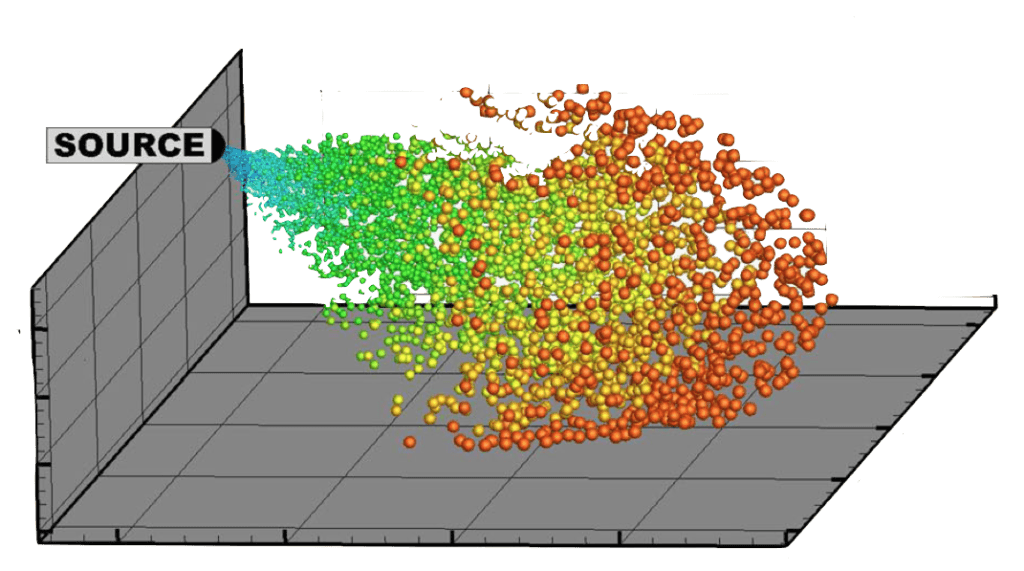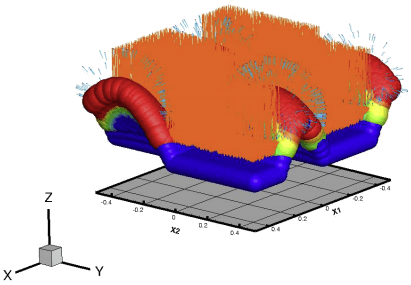
Year 1 Research Project
Digital Twin and Machine-Learning for Optimized Pathogen Contact-Tracing Sanitation and Decontamination
>_
Description
BACKGROUND
Food safety can ultimately depend on how pathogens are transmitted through the air or are passed along through consecutive surface touches. Surface transmission is further complicated by thin biofilms on food processing surfaces. By developing digital twin and machine learning algorithms, effective mitigation and treatments can be more accurately applied.
GOALS
- Create and validate a digital twin model simulating the spread of viral pathogens through droplets under simulated food facility conditions.
- Create and validate a digital twin model simulating the spread of Listeria in a food processing facility based on interactions among people, equipment, and food products.
- Apply machine learning models in the detection of biofilms on food contact surfaces using imaging/spectroscopic approaches.
- Create and apply digital twin models of light propagation and biofilm absorbance to deliver adequate dosimetry for the inactivation of viral particles.
IMPACT
- Worker safety can be better protected at food processing facilities through modeling and management of aerosols.
- Consumer safety can be increased through more targeted decontamination of biofilms.
>_
Photos
>_
Team

Tarek Zohdi
Principal Investigator

Nitin Nitin
Co Principal Investigator

Rebecca Abergel
Collaborator

Ana Arias
Collaborator

Renata Ivanek
Collaborator

Xin Liu
Collaborator

Simo Mäkiharju
Collaborator

Christopher Simmons
Collaborator

Ilias Tagkopoulos
Collaborator

Luxin Wang
Collaborator

Martin Wiedmann
Collaborator
>_
Publications

Journal Article ⏐ Biotechnology and Bioengineering 2022Journal Article ⏐ Biotechnol. Bioeng. 2022
Modeling Bioaffinity-based Targeted Delivery of Antimicrobials to Escherichia Coli Biofilms Using Yeast Microparticles. Part I: Model Development and Numerical Simulation

Journal Article ⏐ Aerosol Science and Technology 2022Journal Article ⏐ Aerosol Sci. Technol. 2022
Effect of Coherent Structures on Particle Transport and Deposition From a Cough
Thacher, Eric,and Simo A Mäkiharju
DOI: 10.1080/02786826.2022.2044449

Journal Article ⏐ Postharvest Biology and Technology 2021Journal Article ⏐ Postharvest Biol. Technol. 2021
Machine Learning Analysis of Phage Oxidation for Rapid Verification of Wash Water Sanitation
DOI: 10.1016/j.postharvbio.2021.111654

Journal Article ⏐ Biotechnology and Bioengineering 2022Journal Article ⏐ Biotechnol. Bioeng. 2022
Modeling Bioaffinity‐based Targeted Delivery of Antimicrobials to Escherichia Coli Biofilms Using Yeast Microparticles. Part II: Parameter Evaluation and Validation
DOI: 10.1002/bit.27969

Journal Article ⏐ Frontiers in Artificial Intelligence 2022Journal Article ⏐ Front. Artif. Intell. 2022
Spectroscopy Approaches for Food Safety Applications: Improving Data Efficiency Using Active Learning and Semi-supervised Learning
DOI: 10.3389/frai.2022.863261

